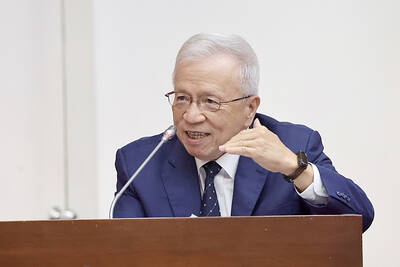Machinery maker Hiwin Technologies Co (上銀科技) on Monday reported record-high sales for last month and last quarter, thanks to strong market demand that has caused a shortage of ball screws and linear guideways.
Consolidated sales increased 48.84 percent from the same period last year to NT$2.38 billion (US$81.2 million) and 24.75 percent from the previous month, the Taichung-based company said in a filing with the Taiwan Stock Exchange.
Cumulative sales from January to last month totaled NT$6.55 billion, an annual increase of 52.37 percent from NT$4.3 billion in the same period last year, Hiwin said.
Hiwin is a top three supplier of linear-motion components globally, including linear guideways and ball screws, which together account for more than 80 percent of its revenue.
By leveraging its strength in key components, the company has also ventured into industrial robotics over the past few years.
The company’s first-quarter sales rose 6.5 percent from the previous quarter’s NT$6.15 billion and grew for two consecutive quarters, mainly attributable to surging orders of semiconductors, machine tools, automobiles and optoelectronics, Taishin Securities Investment Advisory Co (台新投顧) said in a note on Tuesday.
Hiwin’s top-line growth performance also benefited from the contribution from its new factory in Chiayi Dapumei Precision Machinery Park (嘉義大埔美精密機械園區), which started mass production after the Lunar New Year holiday, Taishin said.
The market’s tight supply and demand conditions have prompted Hiwin to implement a prepayment policy to reduce the risk of double orders for linear-motion components by clients, KGI Securities Co (凱基證券) analyst Angus Chuang (莊政翰) said in a note on Monday last week, citing the brokerage’s recent check with downstream firms.
This indicates that strong order momentum could be sustained allowing the company to raise prices going forward, Chuang said.
KGI has revised its sales growth forecast for Hiwin, expecting the company to see sales increase 33.2 percent to NT$28.19 billion this year, while Taishin predicted full-year sales to grow 34.4 percent to NT$28.45 billion.
Separately, pneumatic components suppliers Airtac International Group (亞德客) and Taiwan Chelic Corp Ltd (氣立) also posted better-than-expected sales for the first quarter.
Airtac said first-quarter sales rose 28 percent annually to NT$3.61 billion in New Taiwan dollar terms, or 26 percent to 782.88 million yuan, benefiting from recovering market demand, as well as company efforts to launch new products and seek new clients, the company said in a stock exchange filing on Monday.
Taiwan Chelic’s first-quarter sales declined 1.3 percent quarter-on-quater, but increased 43.16 percent year-on-year to NT$379 million, which the company attributed to continued outlet expansion in China that helped drive its sales growth.

JITTERS: Nexperia has a 20 percent market share for chips powering simpler features such as window controls, and changing supply chains could take years European carmakers are looking into ways to scratch components made with parts from China, spooked by deepening geopolitical spats playing out through chipmaker Nexperia BV and Beijing’s export controls on rare earths. To protect operations from trade ructions, several automakers are pushing major suppliers to find permanent alternatives to Chinese semiconductors, people familiar with the matter said. The industry is considering broader changes to its supply chain to adapt to shifting geopolitics, Europe’s main suppliers lobby CLEPA head Matthias Zink said. “We had some indications already — questions like: ‘How can you supply me without this dependency on China?’” Zink, who also

At least US$50 million for the freedom of an Emirati sheikh: That is the king’s ransom paid two weeks ago to militants linked to al-Qaeda who are pushing to topple the Malian government and impose Islamic law. Alongside a crippling fuel blockade, the Group for the Support of Islam and Muslims (JNIM) has made kidnapping wealthy foreigners for a ransom a pillar of its strategy of “economic jihad.” Its goal: Oust the junta, which has struggled to contain Mali’s decade-long insurgency since taking power following back-to-back coups in 2020 and 2021, by scaring away investors and paralyzing the west African country’s economy.

BUST FEARS: While a KMT legislator asked if an AI bubble could affect Taiwan, the DGBAS minister said the sector appears on track to continue growing The local property market has cooled down moderately following a series of credit control measures designed to contain speculation, the central bank said yesterday, while remaining tight-lipped about potential rule relaxations. Lawmakers in a meeting of the legislature’s Finance Committee voiced concerns to central bank officials that the credit control measures have adversely affected the government’s tax income and small and medium-sized property developers, with limited positive effects. Housing prices have been climbing since 2016, even when the central bank imposed its first set of control measures in 2020, Chinese Nationalist Party (KMT) Legislator Lo Ting-wei (羅廷瑋) said. “Since the second half of

AI BOOST: Next year, the cloud and networking product business is expected to remain a key revenue pillar for the company, Hon Hai chairman Young Liu said Manufacturing giant Hon Hai Precision Industry Co (鴻海精密) yesterday posted its best third-quarter profit in the company’s history, backed by strong demand for artificial intelligence (AI) servers. Net profit expanded 17 percent annually to NT$57.67 billion (US$1.86 billion) from NT$44.36 billion, the company said. On a quarterly basis, net profit soared 30 percent from NT$44.36 billion, it said. Hon Hai, which is Apple Inc’s primary iPhone assembler and makes servers powered by Nvidia Corp’s AI accelerators, said earnings per share expanded to NT$4.15 from NT$3.55 a year earlier and NT$3.19 in the second quarter. Gross margin improved to 6.35 percent,